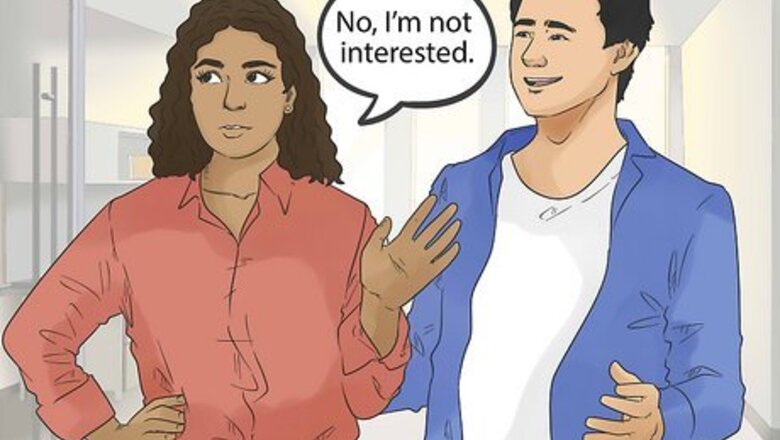
views
Say “no” firmly.
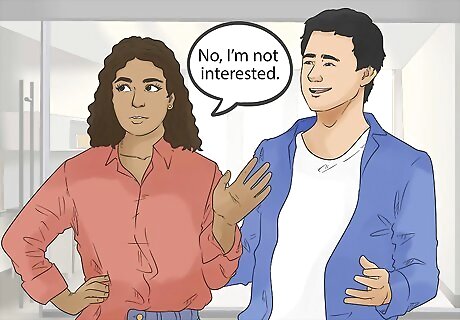
Use a strong, clear voice and tailor your response to the situation. Appearing calm and confident is important when you’re turning someone down, even if you don’t feel particularly calm or confident on the inside. It shows the person that you’re serious, sure, and strong. How you phrase this really depends on the situation, if you’re alone, and how unsafe you feel. For example: If you don’t feel particularly threatened, try, “No, I’m not interested.” If there are other people around, try something like, “No, leave me alone.” If you’re pretty uncomfortable, try, “No, and I’d appreciate it if you’d back off.” Be extremely firm if you feel upset. Try something like, "Do not whistle at me," "No, move away from me now," or "Do not touch me."
Look them in the eyes before you speak.

It’s important to be assertive so you don’t send mixed signals. Averting your eyes and looking nervous can come off as hesitant or even weak. The other person may think you can be convinced, coerced, or taken by force. Even if you're not feeling particularly unsafe or threatened, looking them in the eyes shows them that you’re confident and sure about what you want (and don’t want). Ignoring the person won't nip the behavior in the bud, unfortunately. It’s better to deal with it right then if you feel uncomfortable.
Tell them to get out of your space if they’re too close.
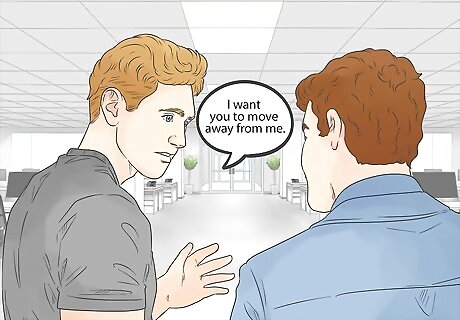
Use “I” statements in a calm voice to make your point clear. If the person hasn’t said anything to you but they keep inching closer and closer, it can be upsetting. This kind of behavior is still harassment, even if they haven't said anything to you yet. Instead of staying silent and dealing with the discomfort, call the person out. Be direct and polite, but don’t mince words. Keep your voice calm and use “I” statements when you respond to avoid provoking them. For example, you could say things like: "I want you to move away from me." ”I don’t like how close you’re standing to me right now.” ”I need more room, please.”
Keep your facial expression neutral.
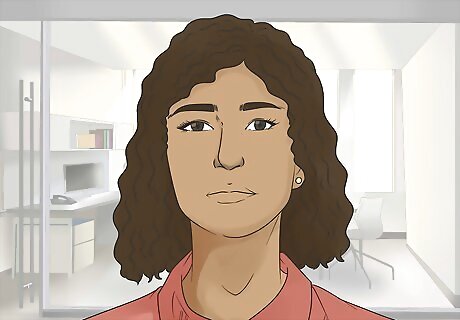
Smiling or openly showing other emotions can be misinterpreted. Unfortunately, if you respond by smiling or being overly casual about the advances, the person may think you’re interested in them. That said, being visibly angry, scared, or annoyed probably won’t help the situation either, and could even make it worse. The best thing to do is keep your face neutral and serious so there’s no ambiguity in your response. Lifting your chin and keeping your shoulders back can also show them how serious and confident you are.
Lie if you need to.
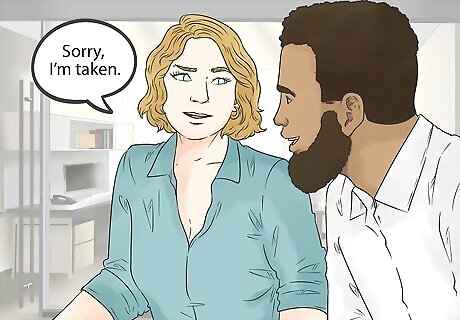
Saying “I have a boyfriend/girlfriend” isn’t ideal, but it can do the trick. You shouldn’t have to give anyone an excuse for why you’re turning them down. If you feel uncomfortable or unsafe, though, it’s more important to get yourself out of the situation as quickly as you can. You can tailor your response to the situation and how unsafe you feel. For example: ”I'm not interested. I have a boyfriend.” ”I’m in a relationship and my girlfriend will be back any minute so...” ”Sorry, I’m taken.” ”I’m happily married, so no.”
Fake a phone call.
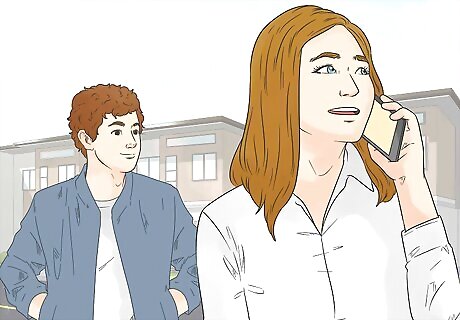
If you're being followed, cross the street and pretend to call someone. Being followed is frightening. If it happens to you, you could pretend to call a friend and say, “I’m almost there, come meet me” or “I’m right around the corner.” If you’re feeling really scared and there’s some distance between you and the other person, get your phone in your hand and threaten to call 911, or pretend you’re already talking to a 911 operator. You can also just dial 911 call and ask for help right then.
Keep moving.
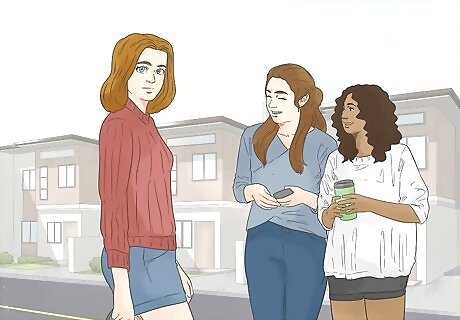
Don’t stop what you’re doing or respond at length. If you’re on the street, just keep walking. If you’re at work, head to the break room. Stopping what you’re doing, even just to respond to them, might be interpreted as an open invitation for more comments. After you give them a firm “no,” break eye contact and get out of there. Move with purpose, like you have somewhere to be, to keep the interaction as brief. Don’t respond to any other comments or questions. If you need to, repeat your original statement and leave.
Go somewhere safe and public.
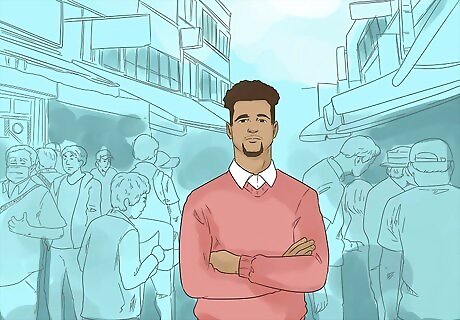
If you’re alone, move to a more crowded area immediately. If you find yourself in a situation like this, it can be really scary. Try to locate other people immediately since the person is more likely to leave you alone if others are around. For example, duck into a nearby shop, restaurant, or business and stay there until the person goes away. If that’s not an option, walk to the next block, the closest bus stop, or a nearby park. If you’re standing in a quiet corner at a party or club, walk over to the crowded bar area. If you're in a crowd, move toward people you know, or you could pick a group of strangers and walk over to them. If you're somewhere like a bar, you could go to the bartender.
Set boundaries and consequences.
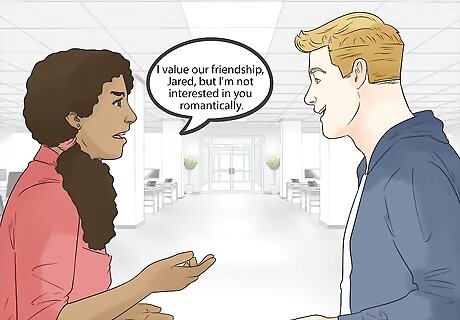
If you know the person personally, make it clear this is a closed topic. You may prefer to let down an acquaintance gently, but be very clear that you are saying no. If you need them to treat you differently after this incident, say that. It’s best to be crystal clear, especially if you expect to see this person around socially or on a daily basis at work. For example: "Bill, I'm flattered, but I'm not interested in anything romantic with you. I enjoy being your coworker, though, and I hope you'll respect my wishes and not bring this up again. If you do, our company policies require that I report the behavior to HR." "I value our friendship, Jared, but I'm not interested in you romantically. I hope you'll respect our friendship and not bring this up again; it makes me uncomfortable. If you don't let this go, I don't think we can be friends anymore."
Stop responding to their texts and messages.
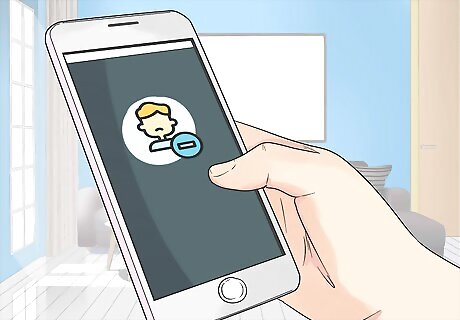
Nip inappropriate texting and DMs in the bud immediately. If someone is pressuring you to send them pictures of yourself or saying unwanted sexual things in texts/emails/DMs, it still counts as harassment and you don't have to take it. Immediately stop responding to that person. If you feel physically threatened or afraid, consider telling someone you trust or reporting the behavior to the police. If they won't stop, block their phone number, "unfriend" them, and make your social media profiles private so they can't communicate.
Do not apologize or feel guilty.
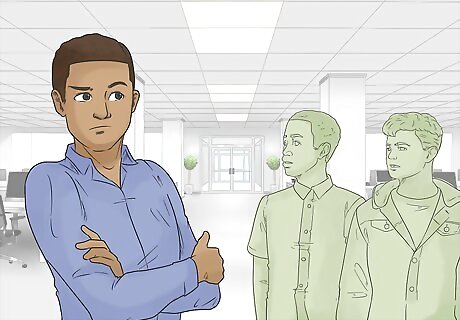
You didn't do anything wrong in this situation. It's normal to want to respond in a polite way that excuses the other person's behavior, especially in awkward situations at work or school. For example, you might want to say, "I'm sorry, but I'm not interested," or "I'm sorry if I gave you the wrong idea" just to smooth things over. You don't need to apologize for how you feel, though. Apologizing allows the person to get away with their behavior. You don't need to feel sorry about holding them accountable for their actions. Holding them accountable makes you strong! You weren't "asking for it" with your clothing or actions. Harassers may try to convince you that you're somehow at fault, but you're not!
Stay calm even if you’re angry or upset.
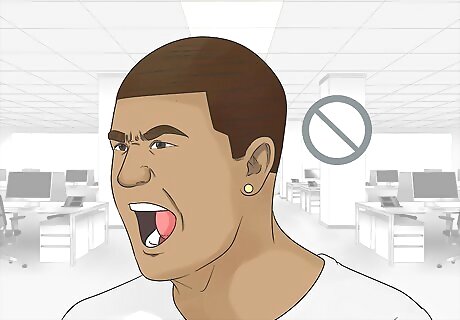
Losing your temper or swearing at them could put you in danger. It feels good to respond to catcallers and other unwanted advances with anger or resentment. Unfortunately, this could backfire. The person could respond violently and the situation may escalate quickly. It can be hard to control your feelings at times like these, but do your best. Even if they don't respond in a threatening way, harassers often enjoy feeding off their victims' emotional reactions. Don't give them one.
Report the behavior.
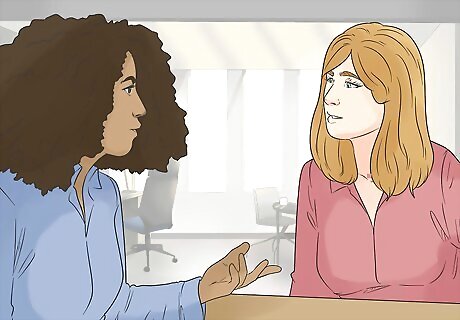
If it happens in a store, at work, or on public transportation, report it. Go to the manager of the business or make your way up to the bus driver and tell them what happened. If you’re catcalled at a construction site or by employees of a business, look around for a logo or business name and call the owner. If you’re groped, flashed, or followed on a city street, you can call the police, report the person, and give them a description. If it's happening at work, report to your supervisor and HR, or take it higher up if nobody is helping you. If it's happening at school, tell your teacher, the principal, and your friends. Get a restraining order if you are being contacted or visited against your will.




















Comments
0 comment